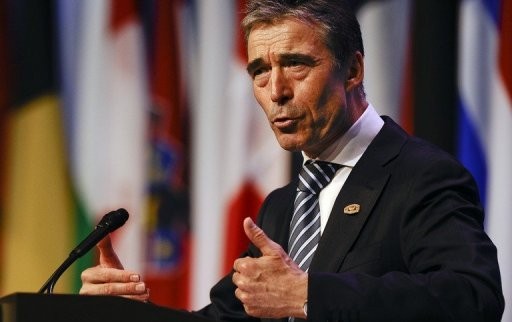NATO chief Anders Fogh Rasmussen Wednesday vowed not to abandon Afghanistan as foreign nations plan to transition forces out of the country after a decade of conflict.

"We will not abandon Afghanistan, we will not leave behind a security vacuum," he told a National Press Club lunch in Canberra.
NATO plans to withdraw its 130,000 troops by the end of 2014, and Rasmussen said there would also be a likely political transition as Afghan President Hamid Karzai is expected to step down at the next election, due the same year.
"Yes, we would expect President Karzai to abide by the Afghan constitution which... doesn't allow him to run again for president," he said.
Secretary General Rasmussen said the international community had a "common interest in and a common responsibility" to see the decade-long intervention in Afghanistan through to a successful end.
He said he understood impatience regarding the conflict in which foreign troops have been helping Afghans fight an insurgency by hardline Taliban militants, saying people "want to see the light at the end of the tunnel".
"People want to see progress, so do I," he said, adding that foreign forces had deployed to Afghanistan to prevent the country from once again becoming a safe haven for terrorists from which to launch attacks.
"Despite this impatience, all ISAF coalition partners have decided to stay committed, to see this operation though to a successful end. And that's encouraging despite the economic crisis and declining public support."
The NATO plan is to progressively hand control for security in the country to Afghan forces, and Rasmussen said he was confident they would be up to the task even as some nations accelerated their drawdowns.
"There may be partners, may be allies, who will reduce their troops' presence during the transition period but they have declared they will stay committed throughout the transition until the end of 2014," he said.
"All 50 nations within our ISAF (the NATO-led International Security Assistance Force) coalition have sent the clear message 'in together, out together', and that's a basic principle."
France has announced it will withdraw combat troops by the end of 2012, while Australia has also accelerated the exit of its 1,550-strong force, but both nations have said they will continue to contribute to the overall mission.
"You will see troops reduction and you will see a gradual change of the role of our troops from combat to more and more focus on support, but don't misinterpret it as a rush for the exit," Rasmussen said.
"It's actually part of the strategy that we actually hand over.
"I feel confident that by the end of 2014 the Afghan security forces will be able to take full responsibility for security."
Rasmussen said the timing of the next presidential election, which coincides with the pull-out of foreign troops, had been raised publicly by Karzai, who has suggested the vote could possibly take place a year earlier.
"It's for him to decide," Rasmussen said of Karzai, who was re-elected in a second post-Taliban poll in 2009 amid allegations of widespread voting irregularities.
"But let me stress we will of course, ISAF will of course, be prepared to ensure that elections can take place within a secure environment, also if elections take place in 2014."
Foreign troops have been in Afghanistan since a US-led coalition toppled the Taliban regime in late 2001 for sheltering Osama bin Laden after the 9/11 attacks.
























